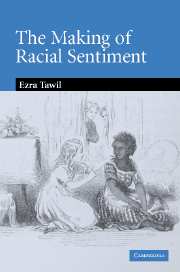Book contents
- Frontmatter
- Contents
- Acknowledgments
- Introduction: Toward a literary history of racial sentiment
- 1 The politics of slavery and the discourse of race, 1787–1840
- 2 Remaking natural rights: race and slavery in James Fenimore Cooper's early writings
- 3 Domestic frontier romance, or, how the sentimental heroine became white
- 4 “Homely legends”: the uses of sentiment in Cooper's The Wept of Wish-Ton-Wish
- 5 Stowe's vanishing Americans: “negro” interiority, captivity, and homecoming in Uncle Tom's Cabin
- Conclusion: Captain Babo's cabin: racial sentiment and the politics of misreading in Benito Cereno
- Notes
- Index
4 - “Homely legends”: the uses of sentiment in Cooper's The Wept of Wish-Ton-Wish
Published online by Cambridge University Press: 22 September 2009
- Frontmatter
- Contents
- Acknowledgments
- Introduction: Toward a literary history of racial sentiment
- 1 The politics of slavery and the discourse of race, 1787–1840
- 2 Remaking natural rights: race and slavery in James Fenimore Cooper's early writings
- 3 Domestic frontier romance, or, how the sentimental heroine became white
- 4 “Homely legends”: the uses of sentiment in Cooper's The Wept of Wish-Ton-Wish
- 5 Stowe's vanishing Americans: “negro” interiority, captivity, and homecoming in Uncle Tom's Cabin
- Conclusion: Captain Babo's cabin: racial sentiment and the politics of misreading in Benito Cereno
- Notes
- Index
Summary
Perhaps more than any other American writer of the nineteenth century, James Fenimore Cooper has been associated with the rejection of the domestic fiction of the European bourgeoisie. One particularly obvious symptom of this critical profile is the uneasy position of Cooper's first novel, Precaution (1820), in his oeuvre. A novel of courtship and manners on the order of Jane Austen's fiction, Precaution is treated, when mentioned at all, as a literary failure, “forgiven and forgotten,” as Robert Darnell has put it. In his discussion of Precaution in Love and Death in the American Novel, Leslie Fiedler even tellingly confused the novel's title with that of Austen's Persuasion. But there is an ironic way in which Precaution does establish Cooper's place in literary history as presently understood, for this first novel sometimes stands in as the sign of everything Cooper's mature work would irrevocably displace in establishing the masculine character of the American novel. Indeed, Fiedler describes the first novel as a kind of experiment in literary transvestism: “Cooper began his career imitating an English gentlewoman entertaining and edifying her peers. It is disconcerting to find him impersonating a female.” Against the backdrop of this early authorial persona, Fiedler celebrates Cooper's artistic maturation as part and parcel of the masculinization of the novel. Cooper's turn to the frontier romance with The Pioneers (1823) represents his final refusal of literary drag in a “self-conscious attempt to redeem fiction at once for respectability and masculinity.”
- Type
- Chapter
- Information
- The Making of Racial SentimentSlavery and the Birth of The Frontier Romance, pp. 129 - 151Publisher: Cambridge University PressPrint publication year: 2006



